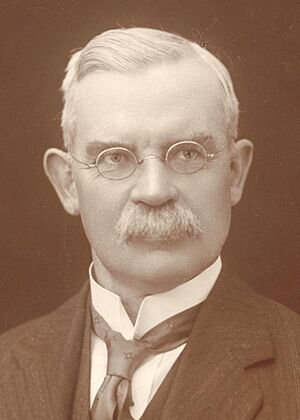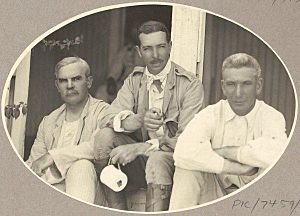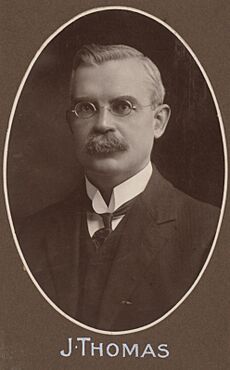Josiah Thomas (politician) facts for kids
Quick facts for kids
Josiah Thomas
|
|
|---|---|
 |
|
| Minister for External Affairs | |
| In office 14 October 1911 – 24 June 1913 |
|
| Prime Minister | Andrew Fisher |
| Preceded by | Lee Batchelor |
| Succeeded by | Paddy Glynn |
| Postmaster-General of Australia | |
| In office 29 April 1910 – 14 October 1911 |
|
| Prime Minister | Andrew Fisher |
| Preceded by | John Quick |
| Succeeded by | Charlie Frazer |
| In office 13 November 1908 – 2 June 1909 |
|
| Prime Minister | Andrew Fisher |
| Preceded by | Samuel Mauger |
| Succeeded by | John Quick |
| Senator for New South Wales | |
| In office 14 November 1925 – 30 June 1929 |
|
| In office 1 July 1917 – 30 June 1923 |
|
| Member of the Australian Parliament for Barrier |
|
| In office 29 March 1901 – 26 March 1917 |
|
| Preceded by | New seat |
| Succeeded by | Michael Considine |
| Member of the New South Wales Parliament for Alma |
|
| In office 17 July 1894 – 11 June 1901 |
|
| Preceded by | New seat |
| Succeeded by | William Williams |
| Personal details | |
| Born | 28 April 1863 Camborne, Cornwall, England |
| Died | 5 February 1933 (aged 69) Croydon Park, New South Wales, Australia |
| Political party | Labor (to 1917) Nationalist (from 1917) |
| Spouses |
Henrietta Ingleby
(m. 1889–1901)Clara Ingleby
(m. 1909) |
| Occupation | Miner, trade unionist |
| Signature | |
Josiah Thomas (born April 28, 1863 – died February 5, 1933) was an important Australian politician. He was first elected to the Australian House of Representatives in 1901. He represented the Labor Party.
Thomas served as a minister in the governments led by Andrew Fisher. He was the Postmaster-General (in charge of mail and telegraphs) from 1908 to 1909 and again from 1910 to 1911. Later, he became the Minister for External Affairs (in charge of Australia's relationships with other countries) from 1911 to 1913.
After a big change in the Labor Party in 1916, Thomas joined the Nationalist Party. He then moved to the Australian Senate, which is the other part of Australia's parliament. He served as a Senator for New South Wales from 1917 to 1923 and again from 1925 to 1929.
Contents
Josiah Thomas's Early Life
Josiah Thomas was born in Camborne, England. His father was a mine manager. As a child, Josiah went to Mexico with his father. Later, he worked in mines in Cornwall, England.
In the mid-1880s, he moved to Australia. He found work in the mines near Broken Hill. In 1886, he was part of a special committee looking into coal mines. By 1890, he was working as a mining captain. He married Henrietta Lee Ingleby in 1889. They had two sons and one daughter.
Thomas became a leader in the Amalgamated Miners' Association (AMA) in 1891. He became president of the Broken Hill branch in 1892. He was also part of a group that defended miners during a big strike in 1892. Because he spoke out against how some legal officials treated miners, he lost his position as a Justice of the Peace. Mining companies then refused to hire him. Even so, as AMA president, he helped with an inquiry into lead poisoning in the mines.
Starting in State Politics
In 1894, Josiah Thomas was elected to the New South Wales Legislative Assembly. This was the state parliament. He represented the area of Alma, which included part of Broken Hill. As a politician, he worked to make workplaces safer and healthier for miners.
He did not support the early plans for Australia to become a united country (federation). He felt that the way people would vote on the plans was not fair enough.
Becoming a Federal Politician
Serving in the House of Representatives
In 1901, Australia held its first federal election. Josiah Thomas was elected to the Australian House of Representatives for the area called Barrier.
He became the Postmaster-General in Andrew Fisher's first government (1908-1909) and second government (1910-1911). In 1911, he became the Minister for External Affairs. This happened after the previous minister, Lee Batchelor, passed away. Other countries welcomed his appointment. A Russian official said Thomas was known for his "broad horizons" and was not narrow-minded. He held this important role until the government lost the election in 1913.
In 1916, Thomas visited England. While he was away, the Labor Party had a big disagreement about whether men should be forced to join the army (conscription). When he returned, he joined a new group called the Nationalist Party of Australia, led by Billy Hughes.
Moving to the Senate
In the 1917 election, Thomas decided not to run for his old seat. Instead, he successfully ran for a spot in the Australian Senate as a Nationalist. He was the first person from New South Wales to have served in both parts of the federal parliament.
In 1918, Thomas led a special committee. He and other senators suggested that alcohol should be completely banned. He also wanted ministers from one part of parliament to be able to speak in the other part. He managed to get this idea approved in the Senate in 1920, but the House of Representatives did not agree to it.
Thomas lost his Senate seat in the 1922 election. However, he was appointed back to the Senate in 1926. This was to fill a spot left empty when another senator passed away. He was defeated again in the 1928 election, and his term ended in 1929. In his last months, he led a committee looking into international wireless telegraphy (early radio communication). The committee suggested that the government should take control of these services, but the government did not accept this idea.
Life Outside Politics
After leaving politics, Josiah Thomas was very active as a Methodist preacher. He spoke out against gambling and smoking. He especially supported the idea of banning alcohol. He also helped set up a radio station in Sydney called 2CH, which was supported by churches.
Josiah Thomas's first wife, Henrietta, passed away in 1901. He then married her sister, Clara Ingleby, in 1909. One of his sons from his first marriage was killed during World War I. Josiah Thomas passed away in 1933 from heart disease in Sydney. He was survived by his second wife and a son from each of his marriages.
 | Chris Smalls |
 | Fred Hampton |
 | Ralph Abernathy |



